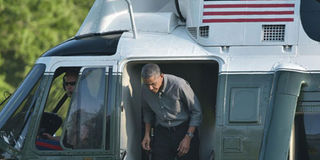It will be a tough balancing act for Obama

US President Barack Obama steps out of Marine One on the South Lawn upon return to the White House on July 18, 2015 in Washington, DC. AFP PHOTO | MANDEL NGAN
What you need to know:
- For Kenya, the meeting aims to boost trade with the US by facilitating business and advocacy for an improved business environment. New investment opportunities are expected to arise.
- The Doing Business in Africa campaign is aimed at creating jobs in the US through increased exports to Africa, for example financing infrastructure projects in clean energy, aviation, banking, construction, and advocacy for infrastructure reform.
- The US has pledged support for the enforcing of laws against wildlife poaching and trafficking, especially after it became clear that these are some of the sources of funding for terrorists, and in 2014 invested $26 million to boost the conservation efforts of several African countries.
In recent years, the US has been sidelined by its traditional African allies, who now favour the Chinese and their “no-strings attached” policy in investment and aid.
China has also become a key development partner for African countries since the global financial crisis of 2007- 2009 caused the West to cut back on its investments in the continent.
The US is keen on boosting its recovery through pursuing opportunities in Africa. It sees this as the best time to reassert its influence in countries where it had a strong presence but now finds the landscape radically changed. Where there was aid dependency, the Chinese have created economic cooperation.
The US now has to come with a strategy similar to that of the Chinese as Africa now demands economic cooperation that is of mutual benefit.
Kenya will this week host the Global Entrepreneurship Summit 2015, which US President Barack Obama will attend. For Kenya, the meeting aims to boost trade with the US by facilitating business and advocacy for an improved business environment. New investment opportunities are expected to arise.
During the US-Africa Leaders’ Summit in August 2014, President Obama made pledges for cooperation in health, climate change, security, social development, wildlife conservation, infrastructure, trade, and governance. It is expected that the US will follow up on these pledges and continue to support initiatives in Kenya.
The Doing Business in Africa campaign is aimed at creating jobs in the US through increased exports to Africa, for example financing infrastructure projects in clean energy, aviation, banking, construction, and advocacy for infrastructure reform. This means a corresponding increase in jobs in Kenya as well as opportunities for growth, especially in renewable energy.
The US is promoting food security in Africa through the AU Commission and the New Alliance for Food Security and Nutrition.
The goal is to lift 50 million people out of poverty in Sub-Saharan Africa by 2022 through $10 billion in investment funding, 1,300 fellowships for young people, and long-term training opportunities. Countering terrorism in East Africa remains an important issue for the US.
The Department of State has invested more than $170 million in strengthening Somalia’s institutions and citizens. Support to the African Union Mission in Somalia has been in the form of training, equipment, and logistics.
The US is expected to continue in its commitment to help root out Al-Shabaab from Somalia.
The US has pledged support for the enforcing of laws against wildlife poaching and trafficking, especially after it became clear that these are some of the sources of funding for terrorists, and in 2014 invested $26 million to boost the conservation efforts of several African countries.
It will be a tough balancing act that President Obama will try to pull off during his visit to Africa. His government needs to create jobs for the US electorate while at the same time doing the same for African countries.
Basing trade policies solely on exporting to Africa is not going to endear the US to African countries, which also want export markets for their own goods.
Kenya should benefit greatly from being first in line as the US rebuilds its trade relations with Africa.
Newton Kibiru works at Grant Thornton Kenya. [email protected]




